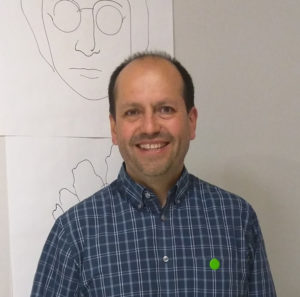To improve vision and patient care, we design devices in collaboration with University of Michigan Department of Ophthalmology and Visual Sciences, in the Kellogg Eye Center. The aims are two-fold:
(1) To help ophthalmologists diagnose and treat patients and
(2) To assist people with low vision to live a better and safer life.
The current projects include assistive devices for people with low vision, diagnostic tools, and surgical devices.
The team currently has the following ongoing projects:
(1) Vision Assistive Device: This research designs products for people with low vision that can make activities of daily life, such as grocery shopping and operating appliances, much easier to perform. The user will be offered enhanced depth perception, as well as magnified images.
(2) Vitreous Biopsy Device: This project is developing a novel medical device that can safely extract fluid from the eye. This fluid can yield useful data for diagnostic tests; however, the fluid is very difficult to extract safely without invasive procedures.
(3) Automated Surgical Instruments Tracking: We will identify and implement reliable and non-intrusive smart techniques for tracking surgical tools during ophthalmic surgeries to assist with training and best practices.
Meeting time and location:
For academic credit, our MDP course is classified as a hybrid course but will mainly meet remotely, following university public health informed guidelines. In the past, our team has typically met at Fridays 8 am- 9 am ET in GG Brown, but a best time will be finalized for each subteam to meet via BlueJeans video conference (distance synchronous communication) for this semester. A two-term commitment will begin January 2021.
Team organization:
Each Assisted Vision subteam has a team leader that reports to and meets with the faculty PI. The teams are flexibly structured to enhance creativity and opportunity for student growth. We have the following project teams: Vision Assistive Device, Vitreous Biopsy Device, and Automated Surgical Instruments Tracking.
More information
First-year undergraduates through masters graduate students are welcome to apply, and all will be encouraged to stay on the team for more than the two-semester minimum. Leadership roles are available in the lab, and experienced students will be a natural fit for these positions as their knowledge grows over time.
Hardware Design (3 Students)
Preferred Skills: Mechatronics/mechanical design, CAD modeling, basic machining, 3D printing
Likely Majors: Mechanical Engineering, Biomedical, Any
Electrical Design (3 Students)
Preferred Skills: Circuit design, PCB layout, wireless communication, instrumentation, image processing, general programming
Likely Majors: Electrical Engineering, CS (All)
Software Design (1 Student)
Preferred Skills: Java coding a plus
Likely Majors: CS (All)
Apprentice Level (3 Students)
Preferred Skills: Interest in project material, willingness to develop skills. Open to first-year and second-year undergraduate students ONLY.
Likely Majors: Any
Faculty Sponsor

Lauro Ojeda
Associate Research Scientist, Mechanical Engineering
Prof. Lauro Ojeda is an Associate Research Scientist with the University of Michigan’s Mechanical Engineering Department. He has over 20 years of experience in the fields of inertial sensing, sensor data fusion, estimation techniques, Kalman filtering, biomechanics and human gait analysis. Ojeda started his career in the field of robot localization systems combining dead-reckoning and inertial sensing, and he later moved to the field of human positioning estimation. Prof. Ojeda was the first to propose a practical approach for inertial-based personal localization, which is currently used widely across the world. His work in this field was later adapted to biomedical applications, specifically unrestrictive gait analysis and is being used in several labs at the University as well as other research centers and commercial companies. Prof. Ojeda has over 40 papers and four patents in the field of position estimation and inertial sensing. He also is passionate about making robots made with LEGO parts as a way to motivate children to learn science, technology, engineering, art and math.
Students: 8- 13
Likely Majors: Any, BME, CS (All), EE, ME
Summer Opportunity: Summer research fellowships may be available for qualifying students.
Citizenship Requirements: This project is open to all students on campus.
IP: Students who successfully match to this project team will be required to sign an Intellectual Property (IP) Agreement prior to participation in January 2021.
Course Substitutions: Honors
